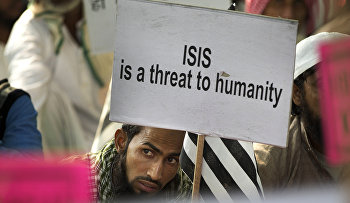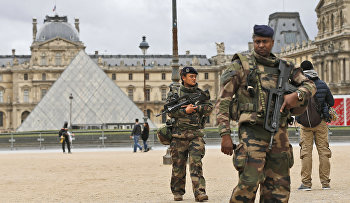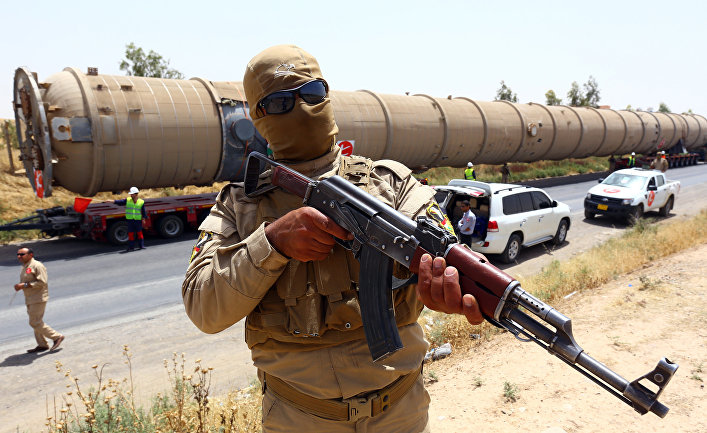France beckons Russia
On Monday the French President, Francois Hollande, presented a plan to parliament for the war on terrorists from the Islamic State – the group which assumed responsibility for the terror attacks inflicted in Paris on 13 November. Hollande announced that the State of Emergency declared on Saturday will be prolonged for a further three months; numbers of police and other security forces will be increased; and that army cuts will not go ahead. He further proposes that citizenship will be cancelled for those attackers who have a second passport; and to make changes in the Constitution, which will give special powers to the President in the event of emergencies.
However, Hollande's major steps – both militarily and diplomatically – concern Syria. It will only be possible to strike ISIL sufficiently fiercely with the assistance of Russia – a country blamed by the moderate Syrian opposition for the recent military successes of the Assad-loyal government forces. This collaboration has been pressed for over the past two days by former French president Nicolas Sarkozy. Hollande gave his agreement to it on Monday, saying it is necessary “to gather everyone capable of fighting ISIL into a single coalition.” The French president announced that he will be holding talks with the leaders of Russia and the USA over the following days.

“We are continuously looking for a solution to the problems in Syria which does not involve either Bashar al-Assad, or our enemies in Syria, by whom I mean ISIL,” the French president declared. “There will be even more air attacks,” Hollande vowed to parliamentarians. This all marks a serious shift in French foreign policy. Professors Damien Ernst and Michelle Hermance wrote in the Belgian magazine Le Vif: “From the moment the Russian intervention began, it seemed that the Americans were quietly talking with the Russians – primarily to avoid any kind of friendly fire incidents between each other's aircraft. The only European head-of-state to make a protest about Russia's deployment was – Francois Hollande.” Now France has come around to believing that “my enemy's enemy is my friend” in relation to Russia, experts believe.
French President @fhollande hopes for the U.S. and Russia to unify in the face of #ISIS https://t.co/stPa0yvYZs pic.twitter.com/6CboaVzi8o
— CNN Politics (@CNNPolitics) November 22, 2015
British Prime-Minister David Cameron believes in the expediency of “positive talks” with Putin. Together with Barack Obama at the G20 talks in Antalya, Turkey, Cameron attempted to convince the Russian president of the need to join forces in the fight against ISIL. The London-published Daily Telegraph quoted a government source as saying that London, Washington and and European nations are working closely with the Russians — in order to set up a “coherent approach to Russia on the topic of ISIL and Syria.”
Vienna consensus
The convergence of Russian and Western views on the issue of Syria has grown steadily stronger over the past month. Leaders of seventeen UN and EU nations (including Russia and the USA) gathered on November 14 in Vienna. The delegates resolved to begin immediate talks with the differing Syrian groups opposed to President Assad. A truce must first be established between the warring sides, with a deadline of eighteen months to hold fresh elections. Assad's name does not appear anywhere in the resulting documents – it seems the West has now finally lifted its demands for his ouster.
The results of the meeting were met with skepticism from experts. “The delegates agreed to support the cease-fire process as soon as the warring sides take the first steps towards transition (from the president-state of Assad, to a ruling coalition). But no-one knows why this particular ceasefire will work, or how – when all others before have failed” writes Hassan Hassan – a researcher from the British think-tank Chatham House, writing in the pages of the Emirates-published The National. In his opinion, the agreement merely serves to confirm Assad's entrenched position in the country, compared to the armed opposition's – since it automatically casts all those unwilling to negotiate with the regime as “terrorists and refuseniks.”
Russia & US must join forces against ISIS, 'address root causes of terrorism' – UN Sec Gen https://t.co/ZeATt5CfmV pic.twitter.com/BOIWojixRQ
— RT (@RT_com) November 22, 2015
Of course, the Vienna agreement is so far only a set of joint statements. The emergence of a unified coalition against ISIL remains possible, but it will be considerably more difficult to persuade non-Western countries (Turkey, Iran, and Saudi Arabia) than the USA and Russia. This view was expressed to RBK by Andrew C Kuchins, CSIS Russia and Eurasia Program Director at the Institute for Strategic & International Studies. According to Kuchins, these regional powers play a far more important role in the Syrian conflict than do either Russia or the USA.
France delivers a retaliatory blow
While the discussions continued in capital cities, the French Air Force was making its first sorties against Islamist positions in Syria since the Paris terror attacks. There was massive bombing of the official ISIL capital of Raqqa, Twelve aircraft, including six Rafaele fighter-interceptors and four Mirage 2000 jets delivered twenty bombing runs on targets to the north and south of the city centre.
Reports issued by the French Ministry of Defense claim that a command post and a terrorist training centre were destroyed. “Explosions ripped through the entire city” reported Rami Abdel Rahman, head of the London-based Syrian Human Rights Monitoring Centre. Rahman explained that many of the explosions had been caused by bombs falling on ISIL arms caches, causing them to detonate. The French Defense Ministry announced it had been the biggest French air raid since the beginning of the bombing of Islamist positions at the end of September – and that they would now only intensify. On 5 November President Hollande gave orders for additional mobilization in the Persian Gulf, sending the French Navy's flagship, the nuclear aircraft carrier “Charles de Gaulle.” Equipped with 24 multi-purpose fighters, the carrier's arrival will treble the military capabilities of the strike force.
FRANCE: French army chief sees no fast victory against #ISIS — Reuters https://t.co/kYloWTrUbZ pic.twitter.com/rUNY2VdyVs
— Conflict News (@Conflicts) November 22, 2015
“It's simultaneously a display of military might, and a resource that enables the intensification of our operations” wrote Le Journal du Dimanche, quoting a source within the French government. President Hollande declared on Monday that his country is now at war with ISIL, and needs to deploy “all necessary military force to exterminate terrorism, whilst observing our national values.”

Operation Chammal was begun by the French army and endorsed by Hollande in September 2014, and for the first year was confined to the territory of Iraq. The French bombed ISIL targets within Iraq, with the agreement of the government in Baghdad. French forces only began their assault of Islamist positions in Syria on 27 September 2015 – three days earlier than Russia.
The tidal wave
The previous major French air sortie was launched on 9 November. In that strike the target was Islamist-controlled oil-fields in the Deir-ez-Zor province, in the east of the country. “We have intervened in the events in Syria. Last night we launched an air strike on an oil-processing centre near Deir-ez-Zor, on the Iraqi-Syrian border” ran the statement from then-Defense Minister of France, Jean-Yves Le Drian. This bombing raid launched a new phase of the western alliance's military campaign against the Islamists, which has been called Tidal Wave II. Its purpose is the destruction of the economic structure of the Islamic State — which is primarily financed from the contraband sales of illicit oil production.
To beat ISIS the West must settle on military tactics, stop oil money, counter propaganda https://t.co/Mfd6hakUSk
— Wall Street Journal (@WSJ) November 21, 2015
The Associated Press calculates that in October this year, incomes from the sale of oil would have been netting the terror cell up to $50 million dollars per month. This figure may err on the high side, when compared to stats shared with RBK earlier by American science writer Ayman Jawad al-Tamimi. He claims that he was shown production figures for the Deir-ez-Zor fields, in ISIL-held territory, which showed that sales of crude oil totaled less than 28% of the entire income of the terror group in that region – which was $8.4 million in total per month.
The same region was hit again on Sunday, this time by American air strikes. This time the targets were the oil storage facilities that store contraband crude for delivery to Turkey and Iraqi Kurdistan. First estimates suggest that 116 of the 295 oil-cisterns in the region were destroyed in the raids. Russia, too, has been busy in hitting at ISIL's economic infrastructure. On Friday the Russian Ministry of Defense announced that it had destroyed a convoy of oil-trucks in the Deir-ez-Sor fields, which were carrying crude oil to Iraqi-located refineries.






